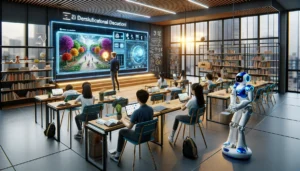Advertising
In a world where technology advances by leaps and bounds, Artificial Intelligence (AI) emerges as a transformative force in multiple sectors, with education being one of the most impacted and promising. The integration of AI into the educational field promises to revolutionize the way we learn, teach and think about education.
Advertising
This blogpost explores the multifaceted contributions of Artificial Intelligence in education, highlighting how it can personalize learning, optimize administrative tasks and create more engaging learning environments, transforming the educational experience in profound and innovative ways.
Personalization of Learning
One of the biggest challenges in the traditional education system is the “one size fits all” approach that often fails to meet the individual needs of students. This is where AI comes in, with its powerful potential to personalize learning. AI-based systems can adapt educational content to each student's pace and learning style, offering a personalized path that can significantly increase learning effectiveness.
Through machine learning algorithms, AI analyzes student responses and behavior to identify strengths, weaknesses, and learning preferences. This analysis allows AI to adjust teaching material in real time, making it more challenging or offering revisions as needed. Imagine a learning environment where each student receives a tailored learning path that improves knowledge retention and keeps students motivated.
Easing the Administrative Burden
Another transformative aspect of AI in education is its ability to automate tedious and time-consuming administrative tasks, freeing teachers to focus on what really matters: teaching. From automatically evaluating multiple-choice tests to more advanced systems capable of evaluating discursive responses and written assignments, AI can provide significant savings in time and effort.

Additionally, AI can assist with classroom management, monitoring student progress, and even early identification of students who may need additional support. These tools do not replace the crucial role of educators, but rather enhance their ability to provide more effective and personalized education.
Interactive and Engaging Learning Environments
AI is also at the forefront of creating more interactive and engaging learning environments. From chatbots that can answer student questions 24/7 to AI-powered simulations and educational games, the possibilities are vast. These digital environments can offer immersive and adaptive learning experiences that stimulate students' curiosity and motivation.
Additionally, AI-driven augmented and virtual reality (AR/VR) are beginning to be integrated into some curricula, providing educational experiences that were unimaginable a decade ago. Medical students can perform virtual surgeries, future architects can design and walk through their creations in 3D, and history students can “visit” ancient civilizations, all thanks to the power of AI.
Challenges and Ethical Considerations
Despite the many benefits, adopting AI in education is not without its challenges. Data privacy issues, algorithmic bias and the need for robust technological infrastructure are just some of the obstacles to overcome. Furthermore, it is vital to ensure that technology is used to complement and enrich the educational experience, rather than replacing the essential human elements that are fundamental to learning.
The success of integrating AI into education will depend on a balanced approach that considers the challenges and the development of ethical policies that prioritize students. Collaboration between educators, technologists and researchers is crucial to creating an educational ecosystem that harnesses the potential of AI while protecting students' rights.
Preparing Educators for the Age of AI
For AI to positively impact education, it is crucial that teachers are trained to use these tools, including technical training and the integration of technology into the curriculum. Continuous investment in the training of educators is essential for their confidence and competence in this new educational era.
Democratizing Education with AI
One of the most exciting aspects of AI in education is its potential to democratize access to quality learning. AI tools can deliver high-quality, personalized educational resources to students around the world, regardless of their location or socioeconomic background. This has the potential to level the educational playing field, offering all students the opportunity to reach their full potential.
Looking to the future
As we look to the future, it is clear that AI has the potential to radically transform the field of education, making it more personalized, efficient and inclusive. However, for this transformation to be successful and ethical, it is crucial that all education stakeholders work together to address challenges and ensure that technology is used in a way that benefits all students.
Ultimately, the promise of AI in education lies not just in its ability to improve learning outcomes or make processes more efficient. Its true promise lies in its ability to inspire a new generation of learners, equipping them with the skills, knowledge and mindsets needed to thrive in an increasingly complex and technological world.
